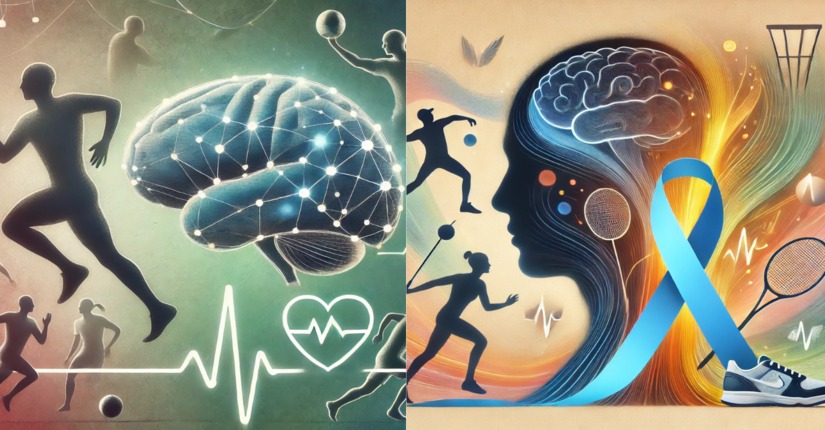Sports Mental Health: Raising Awareness for Change
Sports have always been seen as a test of physical endurance, strength, and skill. However, in recent years, there has been a significant shift in how we view athletes. While the physical side of sports continues to captivate audiences, the mental well-being of athletes is now coming into focus. Sports mental health is a topic that is gaining much-needed attention as it plays a crucial role in an athlete’s overall performance and well-being. The spotlight on mental health is reshaping the world of sports, highlighting the importance of psychological support and offering a new way forward.
The Rise of Mental Health Awareness in Sports
Historically, mental health struggles in sports were often brushed aside. Athletes were expected to be tough, resilient, and impervious to challenges outside of the game. Yet, with increased awareness and open dialogue, the narrative is shifting. Public figures like tennis star Naomi Osaka and Olympic gymnast Simone Biles have become advocates for mental health, showing that even the strongest athletes are not immune to the pressures of their respective sports.
As mental health in sports takes center stage, the conversation is shifting from stigmatization to understanding. Athletes who once hid their struggles are now speaking openly about their challenges, creating a ripple effect throughout the sports community. This growing awareness is slowly but surely transforming how we view sports performance and athlete care.
The Impact of Mental Health on Performance
Athletes are often expected to perform at the highest level, but the pressure to succeed can be overwhelming. Whether it’s the pressure of winning titles, representing a country, or living up to sponsorship deals, the mental strain can take a toll on an athlete’s health. Mental health issues like anxiety, depression, and stress are becoming more common in athletes, making it essential for teams, organizations, and fans to understand how these challenges can affect performance.
Mental health has a direct impact on an athlete’s ability to perform, focus, and recover. If an athlete’s mind isn’t in the right place, their body can’t follow suit. Whether it’s dealing with performance anxiety before a big game or coping with the aftermath of a loss, athletes are now recognizing the need for mental health support.
Breaking the Stigma: Mental Health as a Priority
One of the biggest barriers to mental health support in sports has been the stigma surrounding it. Athletes have traditionally been expected to “tough it out” and keep personal struggles hidden, often fearing they will be seen as weak or unfit for their sport. This mentality is slowly being dismantled as mental health resources become more accessible.
In response to the rising demand for mental health support, many sports organizations and teams have implemented programs designed to provide athletes with the help they need. From mental health professionals embedded within teams to open discussions about mental wellness, the conversation is changing for the better.
How Increasing Awareness is Changing the Play
The effects of increasing awareness about sports mental health are far-reaching. Teams and athletes are taking a more proactive approach to care for their mental well-being. This leads to healthier, longer careers. For example, mental health is now part of preseason training and wellness programs. Athletes are encouraged to prioritize their mental health just as they do with physical fitness.
The focus on mental health is also changing how fans and the media view athletes. In the past, sports coverage focused solely on wins and losses. Now, there is a broader understanding of what it means to be an athlete. Mental health struggles are becoming normalized. Athletes are supported, rather than criticized, when they take time to focus on their well-being.
Changing the Culture: From the Field to the Fans
This shift in mental health awareness is not just changing how athletes view themselves, but also how fans and the broader sports community engage with athletes. Fans are now more empathetic toward the mental health struggles athletes face. Instead of seeing athletes as untouchable icons, there is growing recognition of their humanity and the importance of supporting their mental wellness.
This change in perception has also led to a broader cultural shift. The increasing acceptance of mental health challenges is helping to erase the stigma associated with seeking help. Just as athletes rely on physical therapists for injuries, mental health professionals are becoming just as essential for maintaining peak performance.
The Role of Sports Organizations and Coaches
As sports mental health continues to gain momentum, it’s clear that this is not a passing trend but a movement toward long-term change. The future of sports is about more than just physical skill—it’s about a balance between mind and body. Increased mental health awareness is shaping a future where athletes are supported not only by coaches and fans but also by the infrastructure around them.
conclusion
increasing awareness of sports mental health is revolutionizing the way athletes and organizations approach well-being. As we continue to prioritize mental health, the world of sports will become more inclusive, understanding, and sustainable. This cultural shift is a win for athletes, fans, and the sports community as a whole, ensuring that the next generation of athletes can thrive both mentally and physically.


0 Comment